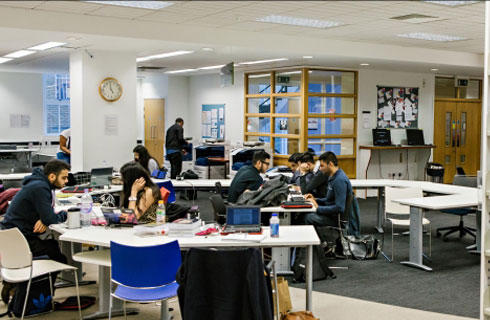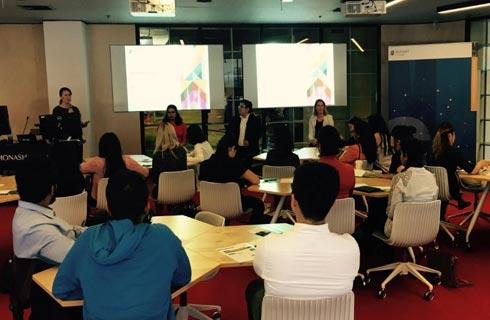计算机加工技术应用科学副学士
Associate of Applied Science in Computerized Machining Technology

学历文凭
Associate Degree

专业院系

开学时间

课程时长

课程学费

国际学生入学条件
Freshman applicants must submit official secondary school mark sheets and diploma. Mailed documents must be originals or copies certified by the school principal or controller of examinations and sealed in a school envelope. Documents not in English must be translated by a certified translator. Official transcripts are also accepted by email if sent directly from the school principal or registrar. Students who do not meet minimum English proficiency requirements may apply for conditional admission, during which time they will need to be enrolled in an intensive English program, such as ISU’s IEI program, in preparation for full-time academic study at ISU. Have graduated from a high school or secondary school with satisfactory grades, received a diploma or certificate of graduation, and be eligible for admission to a major university in the country from which they graduated. All courses within the program must be completed with an overall 2.0 GPA (C or better average)
IDP—雅思考试联合主办方

雅思考试总分
5.5
- 雅思总分:5.5
- 托福网考总分:61
- 托福笔试总分:500
- 其他语言考试:Duolingo – 85
CRICOS代码:
申请截止日期: 请与IDP联系 以获取详细信息。
课程简介
训练有素的机械师为现代社会的技术发展做出了重要贡献。所有类型的制造过程都需要机械技能来设置和操作机床,以根据蓝图,书面和口头信息生产精密零件。该计划为学生提供了通过操作传统机床(如车床,铣床和磨床)来发展加工技能的机会,并获得了基础和中级水平的运行经验:计算机数控(CNC)车床和铣床,计算机-辅助绘图(CAD)和计算机辅助加工(CAM)。该课程是全面的,基于行业,涵盖了特定于行业的知识和一般的工作场所能力。每天大约有三分之二的时间在机加工车间中,用于生产实际的机加工零件。
The Computerized Machining Technology program is operated by the College of Technology, Idaho State University. The program works in cooperation with the Idaho Career & Technical Education and is approved by the State Board of Education. Students will gain knowledge while developing and demonstrating industry-level competencies in the following: • Operation of manual lathes and milling machines; • Computerized Numerical Control (CNC) machine programming and operation; • Computer Aided Drafting (CAD) and Computer Aided Machining (CAM); and • Advanced manufacturing processes and tools. Graduates of the Computerized Machining Technology program will have the following learned capabilities: Understand the use of engine lathes and milling machines and associated safety guidelines as applied to an industrial setting. Ability to read blueprints in order to produce engineered parts and assemblies. Ability to apply programming and operational skills required to manufacture parts using computer-controlled mills and lathes. Ability to utilize mathematical reasoning as applied to the machining trade
The Computerized Machining Technology program is operated by the College of Technology, Idaho State University. The program works in cooperation with the Idaho Career & Technical Education and is approved by the State Board of Education. Students will gain knowledge while developing and demonstrating industry-level competencies in the following: • Operation of manual lathes and milling machines; • Computerized Numerical Control (CNC) machine programming and operation; • Computer Aided Drafting (CAD) and Computer Aided Machining (CAM); and • Advanced manufacturing processes and tools. Graduates of the Computerized Machining Technology program will have the following learned capabilities: Understand the use of engine lathes and milling machines and associated safety guidelines as applied to an industrial setting. Ability to read blueprints in order to produce engineered parts and assemblies. Ability to apply programming and operational skills required to manufacture parts using computer-controlled mills and lathes. Ability to utilize mathematical reasoning as applied to the machining trade
相关申请
 预科
预科 奖学金
奖学金 实习机会
实习机会 在校学习
在校学习 跨境学习
跨境学习 校园授课-线上开始
校园授课-线上开始 在线/远程学习
在线/远程学习
开学时间&学费
学费信息仅供参考,请与IDP联系以获取详细信息
| 开学时间 | 时长 | 学费 | 地点 |
|---|
本校相关课程

应用科学学士
学历文凭
Bachelor Degree
开学日期
课程费用总额


消防管理理学学士
学历文凭
Bachelor Degree
开学日期
课程费用总额


Bachelor of Science in Health Science
学历文凭
Bachelor Degree
开学日期
课程费用总额


Bachelor of Science in Health Physics
学历文凭
Bachelor Degree
开学日期
课程费用总额


护理科学学士-传统
学历文凭
Bachelor Degree
开学日期
课程费用总额


Bachelor of Science in Dental Hygiene
学历文凭
Bachelor Degree
开学日期
课程费用总额

其他相关课程

计算机系统技术文凭
 萨省理工学院
萨省理工学院学历文凭
Bachelor Degree
开学日期
课程费用总额


安大略学院计算机系统技术高级文凭
 圣力嘉学院
圣力嘉学院学历文凭
Bachelor Degree
开学日期
课程费用总额


计算机系统技术高级文凭
 凯布莱恩学院
凯布莱恩学院学历文凭
Bachelor Degree
开学日期
课程费用总额


计算机系统技术高级文凭-网络(可选合作社)
 百年理工学院
百年理工学院学历文凭
Bachelor Degree
开学日期
课程费用总额


安大略学院计算机系统技术高级文凭-系统分析师
 谢尔丹学院
谢尔丹学院学历文凭
Bachelor Degree
开学日期
课程费用总额


计算机系统技术高级文凭
 范莎学院
范莎学院学历文凭
Bachelor Degree
开学日期
课程费用总额










 美国
美国
